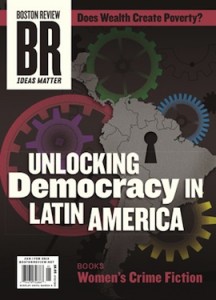 “We’ve come to the end of sexual identity. Not, that is, in the real world, where sexual identities of all sorts still roam, both free and fettered, privileged and disenfranchised; love is still exciting; sex still matters. Real people still come out, or don’t, and consequences still attach to those choices. In art, however, the sturdy house of the novel of sexual identity, with its secret passageways and walk-in/walk-out closets and tempting garden paths and labyrinths, lies in ruins. We don’t really care who enters or leaves it; we pretty much know what goes on inside; we are not trying to peep through the windows.” Read the rest of the article here.
“We’ve come to the end of sexual identity. Not, that is, in the real world, where sexual identities of all sorts still roam, both free and fettered, privileged and disenfranchised; love is still exciting; sex still matters. Real people still come out, or don’t, and consequences still attach to those choices. In art, however, the sturdy house of the novel of sexual identity, with its secret passageways and walk-in/walk-out closets and tempting garden paths and labyrinths, lies in ruins. We don’t really care who enters or leaves it; we pretty much know what goes on inside; we are not trying to peep through the windows.” Read the rest of the article here.
Category Archives: Media
Monica Ong’s “Metal Lungs” on Drunken Boat
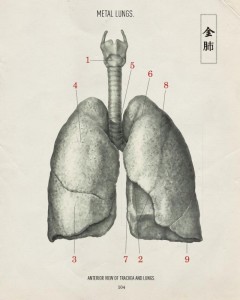 “This artist book begins with a diagram of the lungs, which open to reveal corresponding images and text. Using anatomy as an entry point, a narrative unfolds about the silent body of the “daughter”, dutiful but devastaed in the context of cultural obedience. The lungs, as the origin of voice and breath, become the landscape of suppressed histories, longing for shift.”
“This artist book begins with a diagram of the lungs, which open to reveal corresponding images and text. Using anatomy as an entry point, a narrative unfolds about the silent body of the “daughter”, dutiful but devastaed in the context of cultural obedience. The lungs, as the origin of voice and breath, become the landscape of suppressed histories, longing for shift.”
Digital collage and writing on archival paper, plywood. 2011. Look at the rest of book published on Drunken Boat, here.
Man Gone Down is Michael Thomas’s “luminous debut novel”
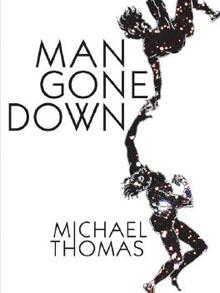 ‘I know things aren’t going well,’’ begins the narrator of Michael Thomas’s debut novel, bracing himself for a downward journey. Broke and bile-infused, Harvard-educated, now jobless and down on his luck in New York, he is estranged from his wife and three children. It is the eve of his 35th birthday, and he has four days to somehow scrape together $12,000 to keep his family afloat.
‘I know things aren’t going well,’’ begins the narrator of Michael Thomas’s debut novel, bracing himself for a downward journey. Broke and bile-infused, Harvard-educated, now jobless and down on his luck in New York, he is estranged from his wife and three children. It is the eve of his 35th birthday, and he has four days to somehow scrape together $12,000 to keep his family afloat.
Read the rest of Lucy Daniel’s review of Michael Thomas’s first book, Man Gone Down, here.
Lydia Davis Interviews Lynne Tillman on Electronic Book Review
 Lydia Davis: Some writers I know are very unhappy writing, and some fly high. On a scale of one to ten, from agonized to elated, what were your feelings in the midst of working on American Genius, A Comedy?
Lydia Davis: Some writers I know are very unhappy writing, and some fly high. On a scale of one to ten, from agonized to elated, what were your feelings in the midst of working on American Genius, A Comedy?
Lynne Tillman: I ran the gamut, from one to ten. One was my not being able to find the voice that moved it all, told it. A ten was, for instance, when I was writing the séance scene, which was so wacky I couldn’t believe I was doing it.
Read the full interview here: http://www.electronicbookreview.com/thread/fictionspresent/uncovered
Check Out Our Poster for the September 10th Reading!
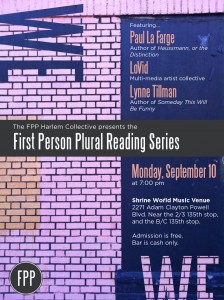 Thanks to Natalie Molina for our new First Person Plural Harlem posters. Our co-founder Stacy Parker Le Melle takes photographs all over Harlem and Natalie turns them into art! We love how Natalie brings out the complex textures of our neighborhood (check out her designs at http://pistoladesign.com). Natalie has designed all of our posters so far, and she’ll be rolling out a new design for each of the four FPP readings this season. Check back for more great visuals! And mark your calendars: the first FPP reading of the season will be at Shrine on September 10th, featuring Paul La Farge, art duo LoVid, and Lynne Tillman.
Thanks to Natalie Molina for our new First Person Plural Harlem posters. Our co-founder Stacy Parker Le Melle takes photographs all over Harlem and Natalie turns them into art! We love how Natalie brings out the complex textures of our neighborhood (check out her designs at http://pistoladesign.com). Natalie has designed all of our posters so far, and she’ll be rolling out a new design for each of the four FPP readings this season. Check back for more great visuals! And mark your calendars: the first FPP reading of the season will be at Shrine on September 10th, featuring Paul La Farge, art duo LoVid, and Lynne Tillman.
FPP Harlem on Fiction Writers Review
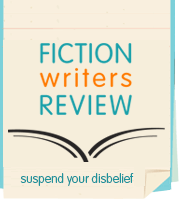 Celeste Ng at Fiction Writers Review, asks why the first person plural is used less frequently than other points of view in contemporary fiction: “But what about the first person plural? Why haven’t we, as writers, embraced this viewpoint and its potential? A few of us—Jeffrey Eugenides, Steven Millhauser—have tackled it, but most of us just shrug our shoulders and turn to our old tried-and-trues.” To join in this discussion, visit FWR here.
Celeste Ng at Fiction Writers Review, asks why the first person plural is used less frequently than other points of view in contemporary fiction: “But what about the first person plural? Why haven’t we, as writers, embraced this viewpoint and its potential? A few of us—Jeffrey Eugenides, Steven Millhauser—have tackled it, but most of us just shrug our shoulders and turn to our old tried-and-trues.” To join in this discussion, visit FWR here.
In The New Inquiry: Ed Park’s Personal Days, First Person Corporate?
 Anton Steinpilz offers a thoughtful and in-depth analysis of characteristics the neoliberal novel in The New Inquiry. He considers Ed Park’s Personal Days as part of that emerging project. “Here Park manages to articulate a narrative point of view you might call first-person corporate — which, incidentally, he marshals throughout the whole of Personal Days to great effect, giving new impetus and texture to Dilbertian anomie. The resonances with Tretyakov’s biography of the object are obvious; but whereas Tretyakov points toward overcoming workers’ alienation, Park simply characterizes such alienation in terms consistent with 21st-century work life. Tretyakov imagines a novel without a hero. Park imagines one without a reader.” For the entire essay, click here.
Anton Steinpilz offers a thoughtful and in-depth analysis of characteristics the neoliberal novel in The New Inquiry. He considers Ed Park’s Personal Days as part of that emerging project. “Here Park manages to articulate a narrative point of view you might call first-person corporate — which, incidentally, he marshals throughout the whole of Personal Days to great effect, giving new impetus and texture to Dilbertian anomie. The resonances with Tretyakov’s biography of the object are obvious; but whereas Tretyakov points toward overcoming workers’ alienation, Park simply characterizes such alienation in terms consistent with 21st-century work life. Tretyakov imagines a novel without a hero. Park imagines one without a reader.” For the entire essay, click here.
Check out this preview of Bathsheba Doran’s Kin in TimeOut NY
 TimeOut New York’s preview of Bathsheba Doran’s Kin might help explain why we are so excited to have her read with FPP Harlem, if you don’t already know. “Doran’s effortless dialogue and finely textured moods evoke the sweeter end of indie cinema, so there’s little wonder she has a parallel career scripting HBO’s Boardwalk Empire and adapting The No. 1 Ladies’ Detective Agency for film. Kin, though, is stubbornly theatrical. Doran has written an intimate story by telling its nonintimate details, peripheral moments (like after-the-kiss debriefs with family members) that nonetheless coalesce into something penetratingly romantic. Much as she did in Parents’ Evening, in which a fought-over child never appeared, Doran has actually written around her story. This forces audiences into becoming complicit in imagining the central relationship. Doran’s diffidence has made its way into the weft of her written material.” For the entire preview, click here.
TimeOut New York’s preview of Bathsheba Doran’s Kin might help explain why we are so excited to have her read with FPP Harlem, if you don’t already know. “Doran’s effortless dialogue and finely textured moods evoke the sweeter end of indie cinema, so there’s little wonder she has a parallel career scripting HBO’s Boardwalk Empire and adapting The No. 1 Ladies’ Detective Agency for film. Kin, though, is stubbornly theatrical. Doran has written an intimate story by telling its nonintimate details, peripheral moments (like after-the-kiss debriefs with family members) that nonetheless coalesce into something penetratingly romantic. Much as she did in Parents’ Evening, in which a fought-over child never appeared, Doran has actually written around her story. This forces audiences into becoming complicit in imagining the central relationship. Doran’s diffidence has made its way into the weft of her written material.” For the entire preview, click here.
Margo Jefferson Riffs on FPP in Untapped New York!
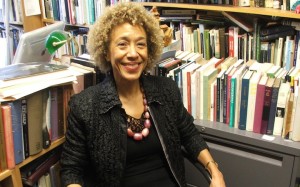 Check out this great profile by Laura Itzkowitz on Margo Jefferson and the First Person Plural Reading Series in Untapped New York!
Check out this great profile by Laura Itzkowitz on Margo Jefferson and the First Person Plural Reading Series in Untapped New York!
Thanks to Untapped New York for keeping their coverage local and always—cool.
Margo Jefferson Interviewed on The Aviary Online
 Check out this great interview of Margo Jefferson by FPP Harlem co-founder Amy Benson in the February 2012 issue of The Aviary Online.
Check out this great interview of Margo Jefferson by FPP Harlem co-founder Amy Benson in the February 2012 issue of The Aviary Online.
In the interview, Jefferson says:
If you love something aren’t you always conned by it? We claim not to believe the word “objective” anymore, we want to believe we can master it somehow. And yet we have to have some element of belief. Belief is surrender, it’s yielding up your capacities even to necessarily be on equal terms with something.
Read the rest of the interview here.
